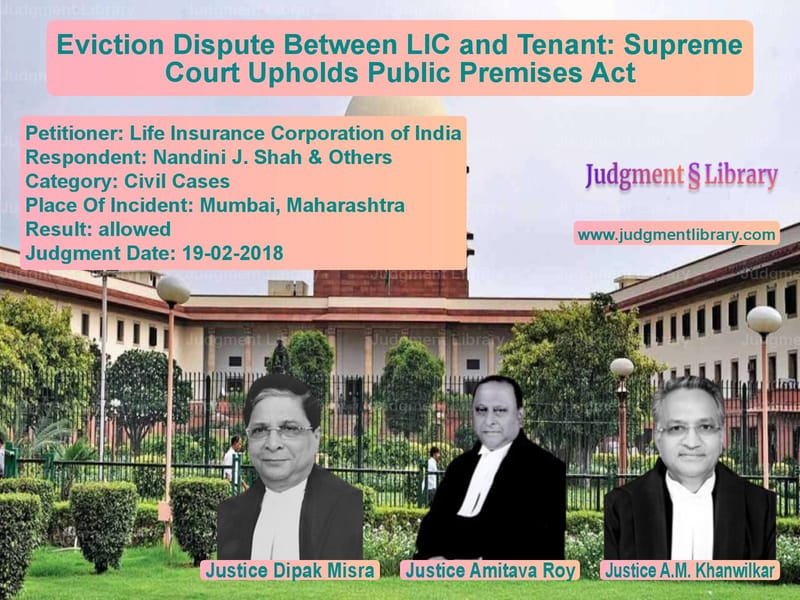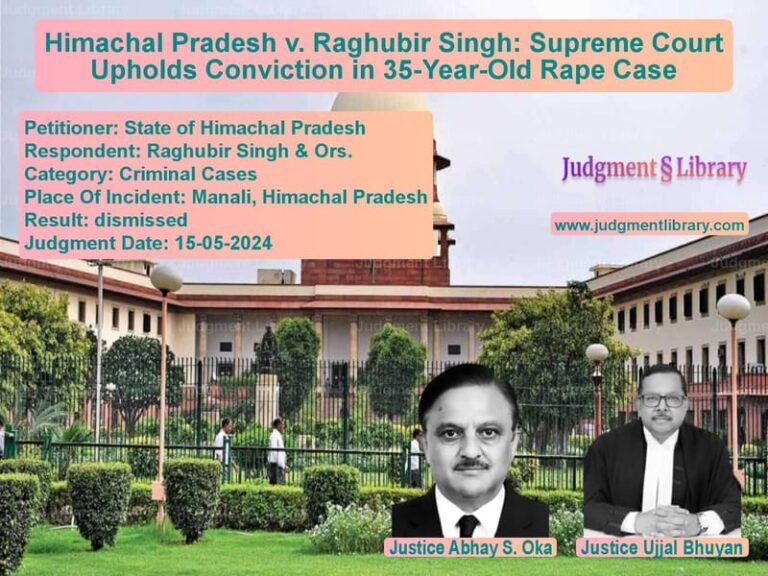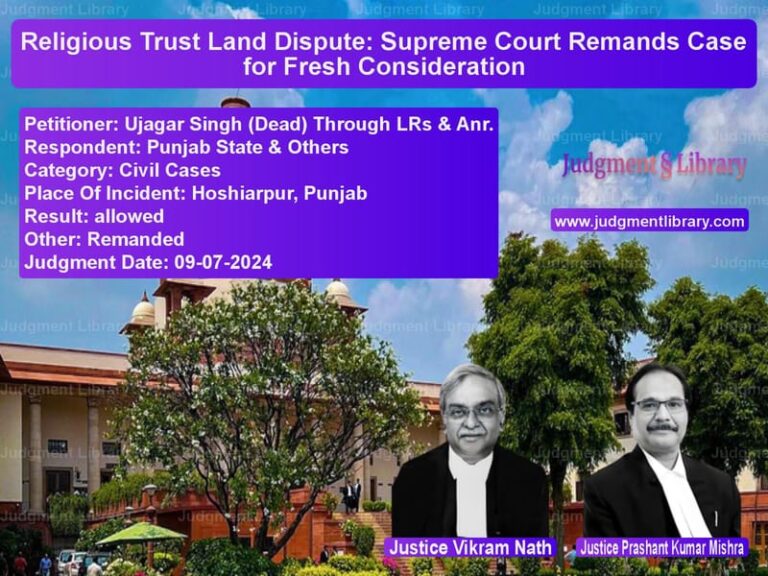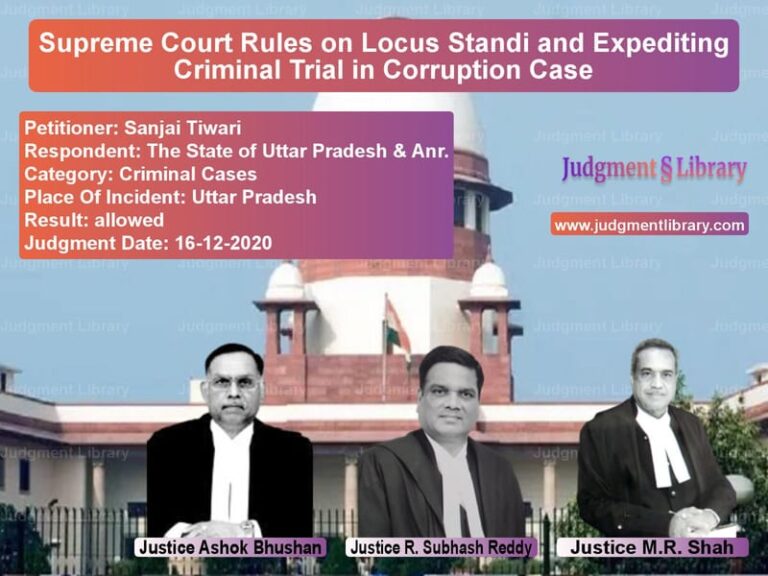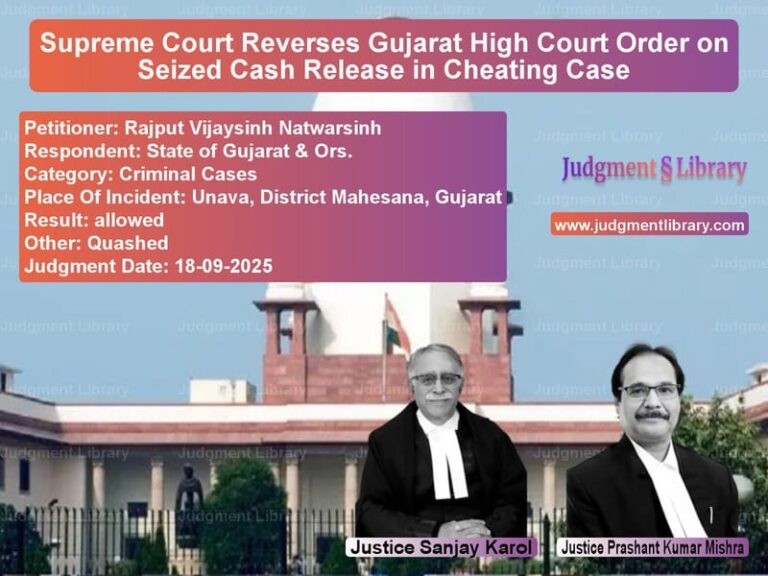Eviction Dispute Between LIC and Tenant: Supreme Court Upholds Public Premises Act
The Supreme Court of India, in its judgment dated February 20, 2018, ruled in favor of the Life Insurance Corporation of India (LIC) in a long-standing eviction dispute against Nandini J. Shah & Others. The case revolved around the applicability of the Public Premises (Eviction of Unauthorised Occupants) Act, 1971, and whether the District Judge, acting as an Appellate Officer under Section 9 of the Act, functions as a Civil Court or a persona designata. The Supreme Court clarified this legal question and reinstated the eviction order, reinforcing the interpretation of judicial powers in public premises eviction cases.
Background of the Case
The dispute arose when LIC, the owner of a commercial property in Mumbai, initiated eviction proceedings against the respondent, Nandini J. Shah, citing the following reasons:
- Unauthorized subletting: The respondent was accused of subletting the premises to third parties without LIC’s consent.
- Failure to pay maintenance charges: LIC claimed that the respondent had defaulted on essential payments related to repairs and upkeep of the property.
LIC filed a complaint before the Estate Officer under the Public Premises Act, which governs the eviction of unauthorized occupants from properties owned by government entities and public sector undertakings. The Estate Officer ruled in favor of LIC, ordering the eviction of the respondent.
The respondent challenged this order before the Appellate Officer, who upheld the eviction. Dissatisfied, the respondent then approached the Bombay High Court under Articles 226 and 227 of the Constitution.
High Court’s Decision
A Single Judge of the Bombay High Court dismissed the petition, affirming the eviction order. However, the respondent filed an intra-court appeal before a Division Bench under the Letters Patent, arguing that:
- The Appellate Officer under Section 9 of the Public Premises Act does not function as a Civil Court but as a persona designata (a specially designated authority outside the judicial system).
- If the Appellate Officer was not a Civil Court, then an appeal under Letters Patent was maintainable.
The Division Bench accepted these arguments, overturned the eviction order, and held that the Appellate Officer was a persona designata, making the Letters Patent Appeal valid.
Aggrieved by this ruling, LIC approached the Supreme Court.
Key Legal Issues
- Whether a District Judge, while acting as an Appellate Officer under Section 9 of the Public Premises Act, functions as a Civil Court.
- Whether an intra-court appeal under the Letters Patent was maintainable in such cases.
- Whether the Division Bench was correct in overturning the eviction order based on procedural interpretations.
Petitioner’s Arguments (Life Insurance Corporation of India)
LIC argued before the Supreme Court that:
“The Appellate Officer under Section 9 of the Public Premises Act is not a persona designata but functions as a Civil Court exercising judicial authority.”
LIC further contended:
- The Bombay High Court’s Single Judge correctly dismissed the petition, and the Division Bench erred in entertaining the Letters Patent Appeal.
- Judicial officers performing appellate functions under the Public Premises Act should be considered Civil Courts.
- The respondent had been illegally subletting the premises and failed to comply with essential obligations.
Respondent’s Arguments (Nandini J. Shah)
The respondent countered by stating:
“The Appellate Officer under Section 9 of the Public Premises Act does not function as a Civil Court but as a specially designated officer, making the Letters Patent Appeal valid.”
The respondent also argued:
- Since the Appellate Officer was not a Civil Court, the Division Bench had the authority to entertain the appeal.
- The eviction order was excessive and ignored crucial facts related to the lease agreement.
- The Public Premises Act’s provisions should be interpreted in favor of the tenant’s rights.
Supreme Court’s Judgment
The Supreme Court ruled in favor of LIC, holding that:
“The District Judge, while acting as an Appellate Officer under the Public Premises Act, exercises judicial powers akin to a Civil Court. Consequently, an intra-court appeal under Letters Patent is not maintainable.”
The Court set aside the Division Bench’s ruling and restored the eviction order, stating:
- The Appellate Officer under Section 9 of the Public Premises Act performs functions similar to a Civil Court.
- Since the appeal before the High Court was under Article 227, a Letters Patent Appeal could not be entertained.
- Allowing intra-court appeals in such cases would create unnecessary delays in eviction matters.
Implications of the Judgment
This ruling has significant implications:
- Clarifies Jurisdiction: The judgment settles the debate on whether Appellate Officers under the Public Premises Act are Civil Courts.
- Speeds Up Eviction Proceedings: The ruling prevents unnecessary delays caused by intra-court appeals.
- Strengthens Public Premises Act: The verdict reinforces the objective of the Act in ensuring smooth eviction of unauthorized occupants.
Conclusion
The Supreme Court’s decision in Life Insurance Corporation of India vs. Nandini J. Shah & Others is a landmark ruling clarifying the scope of judicial powers under the Public Premises Act. By holding that the Appellate Officer functions as a Civil Court, the judgment prevents procedural delays and reinforces the rights of public institutions to evict unauthorized occupants effectively.
Petitioner Name: Life Insurance Corporation of IndiaRespondent Name: Nandini J. Shah & OthersJudgment By: Justice Dipak Misra, Justice Amitava Roy, Justice A.M. KhanwilkarJudgment Date: 19-02-2018
Don’t miss out on the full details! Download the complete judgment in PDF format below and gain valuable insights instantly!
Download Judgment: Life Insurance Corpo vs Nandini J. Shah & Ot Supreme Court of India Judgment Dated 19-02-2018.pdf
Direct Downlaod Judgment: Direct downlaod this Judgment
See all petitions in Property Disputes
See all petitions in Landlord-Tenant Disputes
See all petitions in Specific Performance
See all petitions in Judgment by Dipak Misra
See all petitions in Judgment by Amitava Roy
See all petitions in Judgment by A M Khanwilkar
See all petitions in allowed
See all petitions in supreme court of India judgments February 2018
See all petitions in 2018 judgments
See all posts in Civil Cases Category
See all allowed petitions in Civil Cases Category
See all Dismissed petitions in Civil Cases Category
See all partially allowed petitions in Civil Cases Category

